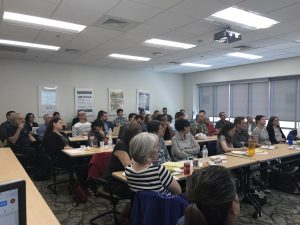Reporting to UMBC’s Committee on the Recruitment, Retention, and Advancement of Underrepresented Minority (URM) Faculty, the STRIDE committee is charged with providing peer education that supports the efforts of search committees, departments/programs, and colleges to recruit, retain, and promote diverse faculty and foster more inclusive and equitable academic spaces for our faculty peers. As a peer education resource, the UMBC STRDE Committee does not create or enforce institutional policy or approve faculty searches.
STRIDE recognizes and continues to benefit from expertise, experiences, and partnership of our faculty colleagues, members of UMBC’s Faculty Affinity Groups, the Committee on the Recruitment, Retention, and Advancement of Underrepresented Minority Faculty, the ADVANCE Executive Committee, the UMBC Inclusion Council, the UMBC PROMISE AGEP-T Program, UMBC’s Initiative for Identify, Inclusion and Belonging, and so many within our community who are committed to UMBC’s core value of inclusive excellence.
STRIDE’s engagement with our faculty peers includes:
Focused Conversations (Campus-Wide)
- Creating an Effective Diversity Hiring Recruitment Plan (September/May)
- Developing Shared Evaluation Criteria (October)
- Best Practices for Reviewing Applications (November)
- Best Practices for Inclusive Interviewing and Selection (December/February)
- Best Practices for Inclusive Mentoring (March)
- Best Practices for Welcoming New Faculty (April)
Departmental/Search Committee Consultations
In these consultations, STRIDE fellows come to your department/program to work through your specific needs or concerns. Prior to the STRIDE meeting, the department or search committee chair meets with the STRIDE Director to discuss the purpose, goals, and needs of this targeted session.
Consultations focus on a range of topics, past consultations have addressed:
- Faculty Hiring Recruitment Plan Creation
- Developing consensus on position description, duties, requirements
- Strategizing an active recruitment plan
- Diversifying applicant pools
- Creating an inclusive job advertisement
- Identify and selecting search committee members
- Implicit Bias in application review and evaluation
- Formulating shared evaluation criteria
- Rubric review and feedback (application evaluation or interview)
- Navigating internal applicants and candidates
- Revising department/search search policies and procedures, including application review and interviewing
- Interview Question Feedback
- Developing departmental/program diversity and inclusion goals
- Mentoring plan development
- The importance and value of diversity and inclusion in higher education
Resources
Meet our Current STRIDE Fellows:
Dena Aufseeser
Ramon Goings
 Lisa Kelly
Lisa Kelly
Associate Professor
Chemistry and Biochemistry
Daniel Lobo

Tim Topoleski
Professor
Mechanical Engineering